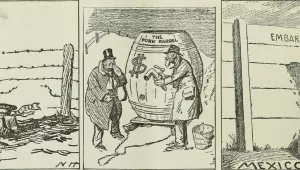We are into the season when you will be flooded with articles and analyses on the 100-year anniversary of the Sykes-Picot agreement that was signed on May 18, 1916. That agreement between Great Britain and France, with Russian acquiescence, defined how they would divide the spoils of the crumbling Ottoman Empire in the East Mediterranean region.
It is appropriate to assess what went wrong since then in troubled lands like Iraq, Palestine, Syria, Lebanon, and others — but this would be neo-colonial intemperance if one mainly looks inside our Arab lands to ask why these people brought onto themselves such violence and fury, without considering the full story.
We read many suggestions that could explain our pain: Perhaps modern statehood is not yet a notion the Arab mind can fully grasp and implement; perhaps Arab societies are too deeply defined by their sectarian sub-identities to be able to manage stable statehood with equal citizenship for all; perhaps Muslim-majority lands simply cannot absorb and learn the ways of secular statehood the West bequeathed us.
Why have most Middle Eastern lands that Great Britain, Italy, and France managed as mandates or colonies become violent wrecks and sources of large-scale conflict and human despair? It is just as dishonest to blame mainly Western colonialism for our national wreckages and rampant instability as it is to blame only Arab people and culture for those failings. We need a more complete and integrated analysis of the multiple phenomena that shaped our last erratic century.
Initially, we must absolutely acknowledge that Arab states’ inability to achieve sustainable economic growth and pluralistic democracies is the core reason for our problems today. The main reason for this reason, however, is to be found in a more complex set of interlocking relationships among powerful political actors inside our countries and capitals far and near.
This requires going back before 1916, maybe a century or two, to recall how European powers conquered much of the world as colonies or sites of unchecked imperial plunder. The main problem with Sykes-Picot is not only what happened in and after 1916; it is also heavily a consequence of the European colonial mindset that matured in the century before 1916, and continued to exercise its colonial prerogatives for decades to follow — perhaps even in today’s continued use of European, Russian, and American military power across our region.
At the same time, three critical issues after 1916 made it virtually impossible for many Arab countries to transition from Euro-manufactured instant states born on after-dinner napkins in the hands of Cognac-mellowed British and French colonial officers, to stable, democratic, prosperous sovereign states.
These three issues were, in their historical order:
1) British support for Zionism and a Jewish state in Palestine in November 1917, which plunged Palestine into endless Zionism-Arabism warfare since then, and sucked in other Arab states, Iran, and others yet;
2) the discovery of large amounts of oil in the Middle East in the 1930s especially, which the West needed to maintain access to for its own industrial expansion; and,
3) the post-1947 Cold War between the U.S.-led West and the Russian-led Soviet Communist states that was translated into perpetual proxy wars across the Middle East for 44 years, and maybe is resurfacing today in new guises.
As these three factors linked with autocratic Arab political regimes and military rule, by the early 1950s Arab democratic transitions had become totally blocked. By the 1980s and 90s, high rates of population growth also had generated severe environmental imbalances and socio-economic disparities — while increasingly corrupted indigenous autocracies, foreign militarism, and debilitating Arab-Israeli warfare continued to define our region. The last 30 years, unsurprisingly, have seen rising political violence, regional warfare, global militarism, socio-economic polarization and disparity, and massive human suffering leading often to desperation and criminality on a large scale. The Sykes-Picot-initiated century proved to be ugly in most arenas of Arab national rights and wellbeing.
So by all means let us recall Sykes-Picot and its consequent tumultuous century, but let us also summon honesty and integrity in analyzing all the regional and global factors that have led to today’s horror shows of stunted, staggered, and shattered Arab statehood. We did this to ourselves, to be sure, but not only by ourselves; we had considerable assistance from many others in the region and the world. This was one of the world’s first global joint ventures in deviant political behavior.
If those in foreign capitals who shared in this would like to nod ever so slightly today in acknowledging their roles in this shocking drama, this moment of remembering Sykes-Picot would be a great time to do so. At least then foreign and local powers today who again wonder how our borders should be re-drawn might wake up to the corrosive consequences of intellectual dishonesty about shared enterprises of transnational dysfunction on an epic scale.
Khouri, Rami. “Yes, let us honestly assess Sykes-Picot’s ugly century.” Agence Global, May 11, 2016




